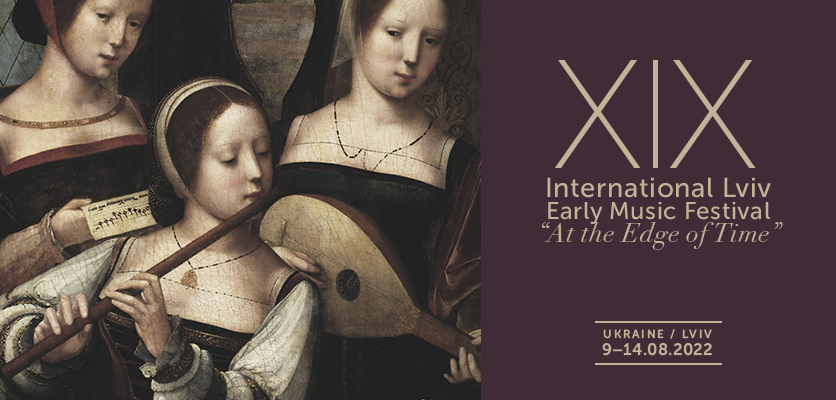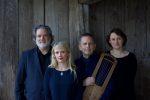Discordia / Concordia
Концертний зал Людкевича
150–300

PART ONE: Two scenes from the BEOWULF epic (anonymous, England, 8th century)
The Anglo-Saxon epic poem Beowulf, which survives in a single manuscript source dating from the early eleventh century, has its roots in the art of the scop (‘creator’), the storyteller and reciter at gatherings, whose services were essential to the fabric of tribal society in early medieval England. The scop would re-tell the story of Beowulf, in song and speech, perhaps accompanying himself on a six-stringed harp (this we know from contemporary accounts, although musical notation was superfluous and only remnants of instruments have survived). His courtly audience was attuned to the finest details of sound and meaning, metre and rhyme, timing and mood. The ‘performance’ — which, for the whole epic, might last five hours — would never be exactly the same twice, as the ‘singer of tales’ subtly varied the use of poetic formulæ to shape his unique version of the story.
This performance features two essential scenes from the epic: the Danes under King Hrothgar have built a magnificent feasting-hall, which is attacked nightly by a malevolent, man-eating monster named Grendel. The terror and attacks persist for twelve long years, and the tribe is plunged into a nightmare of fear and paralysis. But the word of this awful dilemma reaches Beowulf, a supernaturally strong warrior of the Geats (Sweden), who comes with his men to free the Danes from Grendel. Beowulf waits in the cursed hall for Grendel’s arrival in the night, and final combat takes place.
PART TWO: Songs of combat and of the end of time
The musicians Benjamin Bagby and Norbert Rodenkirchen of Sequentia perform lost songs and instrumental pieces from the Frankish world between the 8th and 10th centuries. Framed by instrumentally performed sequences and verse melodies from the monastery of St. Gallen, we perform epic songs in Old High German and Latin, singing of the tragic confrontation between father Hildebrand and his long-lost son Hadubrand, the dark and sad description of the pitiful battle between brothers (Fontenoy, 841), and a German monk’s advice to the living on how to prepare for the end of time.
The only surviving epic text in Old High German is known as the Hildebrandslied. It describes a formal armed encounter between two enemy warriors in front of their armies: the older man, Hildebrand, is actually the father – an exile considered long dead but now returned – of the younger warrior, Hadubrand. As Hildebrand recognizes his son, he tries to tell the tale of his long exile and return, offering a gift. But his son (who was only an infant when he left) believes his father to be long dead and suspects the tricks of an ‘old Hun’, refusing the gift and challenging him to fight. Resigned, Hildebrand bemoans his cruel fate (‘Wêwurt skihît!’), to kill or be killed by his own son. The blows begin to fall as the fragment breaks off.
Source: Kassel, Landesbibliothek, Cod. theol. fol. 54 (ca. 830) / musical reconstruction: B. Bagby
Aurora cum primo mane. Carolingian carmina on the battle of Fontenoy (Angelbertus. ca. 841)
The descendants of Charlemagne did not manage to hold his empire together. Many years after this death, on 25 June 841 near the village of Fontenoy, the allied armies of Charles the Bald and Louis the German fought a terrible battle against their own brother, Lothar. The poet Angelbertus, who fought with Lothar, wrote this deeply sad and dark song about the terrors and desolation of warfare.
Source: Paris, BNF lat. 1154 (10c) / Transcription/Reconstruction: B. Bagby, with thanks to Sam Barret (Cambridge University).
Thes habet er ubar woroltring. “De die Iudicii” from the “Gospel Book” (Otfrid von Weissenburg / Alsace, †875)
This heartfelt description of the final judgement is taken from the Evangelienbuch of the Alsatian monk Otfrid von Weissenburg (the first German poet whose name we know), who wrote commentaries and paraphrases on the Gospels in the local German dialect (which he calls Frankish) of his fellow brothers and the nearby noblemen. In a prologue, he states that a pious matron named Judith urged him on in this work. These verses were not intended for silent reading, but were probably “performed” before a partially pre-literate audience in the style of the Germanic oral poetry long appreciated by learned men and women. Several manuscript sources of this text contain musical notation. Here, in an excerpt from the chapter entitled “in die iudicii” (“on the Judgement Day”), we experience Otfrid’s very personal involvement with the terrifying story he has to tell.
Source: Heidelberg, Cod.Pal.lat. 52 / Reconstruction: B. Bagby
Artists:
- Sequentia, the ensemble for medieval music
- Benjamin Bagby (US), voice, harp
- Norbert Rodenkirchen (DE), flute, harp
Program:
- PART ONE: Two scenes from the BEOWULF epic (anonymous, England, 8th century)
- PART TWO: Songs of combat and of the end of time
“Sequela: Stans a longe”. Instrumental version (Notker von St. Gallen / 9th century)
“Ik gihorta dat seggen”. Germanic heroic epic (fragment): The Song of Hildebrand (Hildebrandslied) / anon. (late 8th century)
“Ardua spes mundi”. Instrumental version (Ratpert / 9th century)
“Aurora cum primo mane”. Carolingian carmina on the battle of Fontenoy (Angelbertus. ca. 841)
“Sequela: Concordia”. (Instrumental version) Notker von St. Gallen (9th century)
“Thes habet er ubar woroltring”. “De die Iudicii” from the “Gospel Book” (Otfrid von Weissenburg / Alsace, †875)
Moderator: Polina Kordovska
Live broadcast provided by:
Andrij Zelenyj, camera
Mykola Khshanovskyi, live broadcast director
Marian Lesiuk, sound director
Bohdan Sehin, producer
***
“Ukraine–2022. Muses Are Not Silent” is a concert series in support of Ukrainian musicians during the russian armed aggression. Online concerts will become a platform for the uniting of the Ukrainian music community, as many musicians participating in these concert programs have become internally displaced people and have found shelter in Lviv.
We provide a free opportunity for the whole world to watch concerts on the official YouTube channel of the Lviv National Philharmonic. At the same time, we suggest our listeners from abroad make charitable donations to Ukrainian musicians who have stayed here in Ukraine.
CHARITABLE HELP FOR UKRAINIAN MUSICIANS: Bank details | PayPal | Patreon






